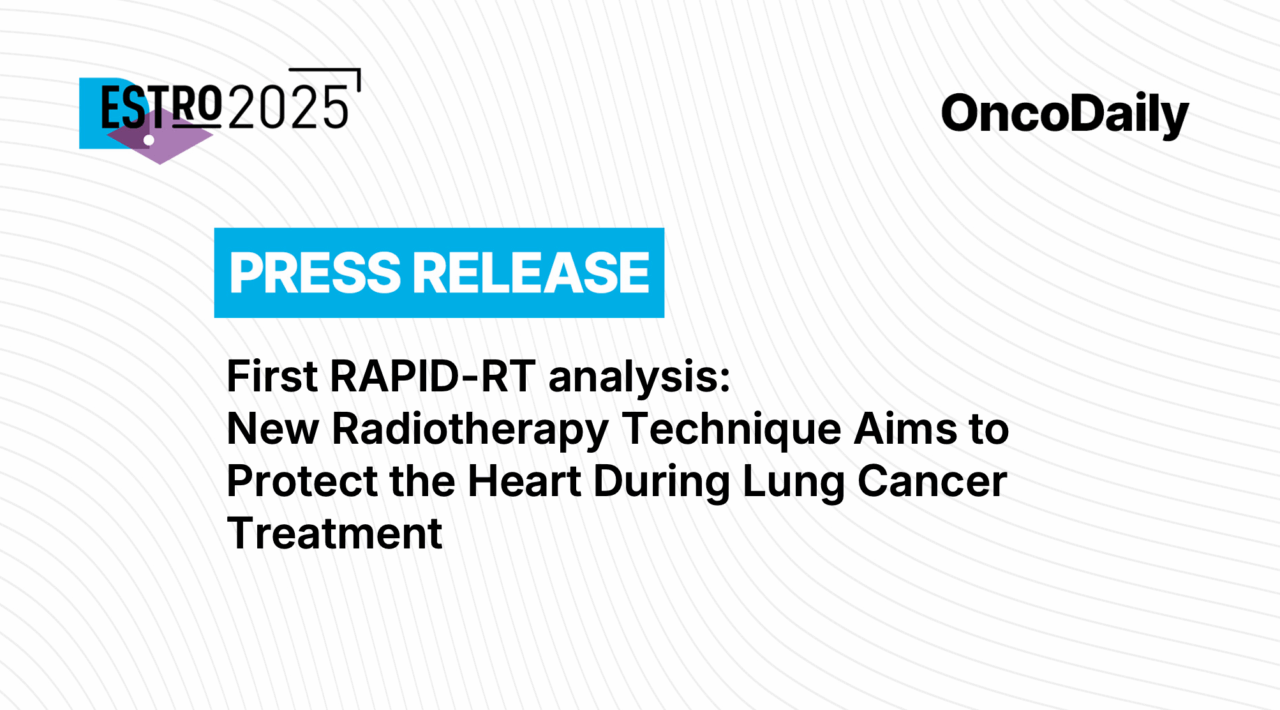
First RAPID-RT analysis at ESTRO 2025: Using rapid-learning to assess the survival impact of a new cardiac avoidance area during lung cancer radiotherapy
Vienna, Austria — A new study presented at ESTRO 2025 introduces the RAPID-RT study, a pioneering initiative designed to accelerate the evaluation of treatment modifications in radiotherapy using a real-world, rapid-learning model. Unlike traditional clinical trials, which are often slow and exclude many patients due to narrow eligibility criteria and complex consent protocols, RAPID-RT offers a pragmatic and inclusive alternative.
Developed by researchers at The Christie NHS Foundation Trust in Manchester, UK, the RAPID-RT approach was applied in the treatment of lung cancer to test whether reducing radiation exposure to the upper region of the heart could improve survival by decreasing cardiac toxicity—an often-overlooked consequence of conventional radiotherapy.
Targeting Tumours, Protecting the Heart
Lung cancer tumours frequently lie near the heart, creating a treatment dilemma: how to deliver curative radiation doses while avoiding damage to the heart. Previous research at The Christie highlighted the top of the heart as particularly vulnerable to radiation, with doses to this area linked to poorer survival outcomes.
Building on this insight, the team implemented a new heart-sparing technique directly into routine clinical care. The goal: to reduce radiation exposure to a defined “Cardiac Avoidance Area” (CAA) without compromising tumour control.
“RAPID-RT represents a move toward more inclusive research, aiming to better reflect everyday clinical practice and extend the benefits of radiotherapy innovations to a broader patient population beyond those who meet narrow trial criteria. By reducing cardiac exposure, the study also aims to support improvements in both survival and quality of life.”
Key Data from Over 1,700 Patients
Between January 2021 and February 2025, the RAPID-RT study analysed outcomes in 1,708 patients with stage I–III lung cancer undergoing curative-intent radiotherapy:
-
922 patients treated before April 2023 received standard radiotherapy.
-
786 patients treated from April 2023 onward received the heart-sparing technique, supported by two key innovations:
-
An inclusive rapid-learning design, where all patients are automatically included unless they actively opt out.
-
A defined Cardiac Avoidance Area, limiting the radiation dose to ≤19.5 Gy (or biologically equivalent) across 20–33 sessions, unless it compromised tumour coverage.
-
Only one out of the 786 patients opted out of data sharing, demonstrating the approach’s high inclusivity. Preliminary results suggest a modest improvement in 12-month survival following the implementation of the new technique.
Faster Answers with Real-World Evidence
The rapid-learning model allows researchers to analyse anonymised routine care data in real time, bypassing the delays of traditional trials. This enables continuous evaluation and adaptation of treatment strategies based on current patient outcomes.
“This research highlights how innovation in radiotherapy involves not only advancements in technology but also improvements in how care is delivered and adapted. It illustrates the potential of combining modern technology with real-world data to enhance the safety and effectiveness of radiotherapy.”
Towards Smarter, More Inclusive Evaluation of Radiotherapy Modifications
RAPID-RT is a significant step forward in how radiotherapy trials are designed and conducted. It highlights the potential for real-time, data-driven approaches to evaluate and implement treatment improvements—especially in cases where randomised trials are impractical or too slow.
The study will continue to follow patients and collect long-term data to further validate early findings. Future analyses will assess the effects of heart-sparing techniques on survival, toxicity, and other clinical outcomes. In doing so, RAPID-RT offers a blueprint for smarter, faster, and more inclusive research in cancer care.
About ESTRO 2025
ESTRO 2025 brings together around 7,000 participants from over 80 countries, showcasing the latest research in clinical radiation oncology, radiobiology, medical physics, technology, and brachytherapy. Leading doctors and scientists from around the world present groundbreaking findings, in line with the conference theme: “Transformative innovation through collaboration”. ESTRO 2025 is the annual congress of the European Society for Radiotherapy and Oncology (ESTRO), an organisation dedicated to advancing cancer treatment through radiotherapy and multimodal approaches. ESTRO promotes education, science, and research and advocates for universal access to radiotherapy. With nearly 10,000 members worldwide, it supports radiation oncology professionals and the broader oncology community in their daily practice.
Read ESTRO 2025 Updates on OncoDaily

-
Challenging the Status Quo in Colorectal Cancer 2024
December 6-8, 2024
-
ESMO 2024 Congress
September 13-17, 2024
-
ASCO Annual Meeting
May 30 - June 4, 2024
-
Yvonne Award 2024
May 31, 2024
-
OncoThon 2024, Online
Feb. 15, 2024
-
Global Summit on War & Cancer 2023, Online
Dec. 14-16, 2023
